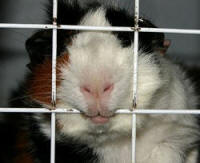|
|

If your Pet begins to show new unwanted behaviors such as excessive vocalization, hair pulling, cage biting, or aggression, the first step is to start a behavioral diary. You will need to begin paying close attention to your Pet's body language and noting what you observe. The diary is the place you write down each incident. Pay close attention to and write down the triggers and markers involved in the incident.
What are triggers?
Triggers are anything that occurs just prior to unwanted behaviors. Use the behavioral diary to make quick notes on what happened just prior to episodes of unwanted behavior.
What are markers?
Your Pet will show you with body language how he or she reacts or responds to a "Trigger". For example, when the guinea pig sees a new person (trigger), the Pet hides, squeals loudly, or tenses up (markers). These are all signs of fear.
Keeping a diary will help you predict and prevent unwanted behaviors. You will learn how to better identify anxiety, agitation, aggression, relaxation, and contentment by watching your Pet's body language. If you decide to consult with a veterinary behaviorist, your behavioral diary will provide valuable information for evaluation.
Common Pet behavior complaints include: excessive chewing, excessive vocalization, suboptimal grooming, and housesoiling or litterbox training issues.
Less common Pet behavior complaints include: excessive fear, excessive grooming or self-mutilation, cage biting, anxiety, and aggression towards people or other animals.
For less common Pet behavior complaints it is always wise to consult with your local veterinarian to rule out any medical issues which may impact behavior.
|